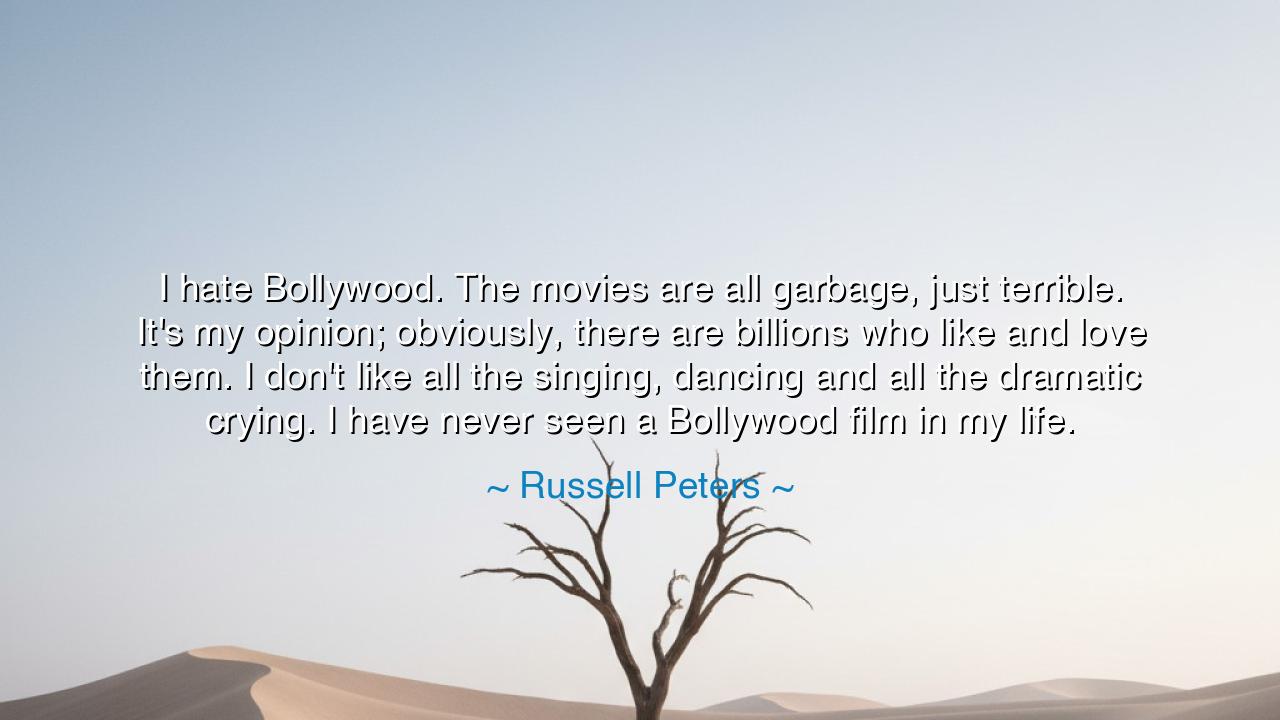
I hate Bollywood. The movies are all garbage, just terrible.
I hate Bollywood. The movies are all garbage, just terrible. It's my opinion; obviously, there are billions who like and love them. I don't like all the singing, dancing and all the dramatic crying. I have never seen a Bollywood film in my life.






Russell Peters' words, "I hate Bollywood. The movies are all garbage, just terrible. It's my opinion; obviously, there are billions who like and love them. I don't like all the singing, dancing, and all the dramatic crying. I have never seen a Bollywood film in my life," are a bold declaration that highlights the complex nature of personal taste and the power of cultural identity. In this statement, Peters expresses a personal preference, but in doing so, he also raises the larger question of how we relate to cultural forms that differ from our own. His words, though unapologetic, carry within them the wisdom of subjectivity—the idea that taste and artistic expression are deeply personal, shaped by one's experiences, influences, and cultural context.
In the ancient world, personal opinion and artistic taste were often expressed with great intensity, but the boundaries of cultural influence were not as fluid as they are today. The Greek philosophers, like Plato and Aristotle, held strong opinions about the arts, with Plato even banishing poets from his ideal republic because he believed their work could corrupt the moral fabric of society. Plato’s rejection of art, especially poetry, was rooted in the idea that art should serve a higher purpose—to inspire virtue and wisdom. He saw the theater of his time as emotionally manipulative, much like how Peters critiques Bollywood’s singing, dancing, and drama. Plato believed that the arts should uplift the soul, but his narrow view did not account for the power of cultural diversity in shaping artistic forms.
Yet, in contrast, Aristotle offered a more balanced view, recognizing the importance of emotional catharsis in theater. In his Poetics, Aristotle wrote that drama, particularly tragedy, could serve as a cathartic experience, purging negative emotions through the display of intense human experiences. Bollywood films, with their emotional extremes, their songs, and dances, may evoke the same catharsis for millions. Peters’ critique may come from his own preferences—shaped by his cultural context—yet for billions, the singing and dancing in Bollywood films are expressions of joy, emotion, and connection that resonate deeply with their lives.
Consider the ancient story of Oedipus Rex, where the audience is moved by Oedipus' tragic realization of his fate, a moment that is drenched in emotion, much like the heightened emotional landscapes of Bollywood films. Oedipus’ despair and self-realization—expressed dramatically on stage—are akin to the over-the-top emotional expressions Peters criticizes in Bollywood. Both are forms of emotional release, though Oedipus Rex comes from the Greek tradition, and Bollywood's style is rooted in its own historical, social, and cultural context. Each, in its own way, offers a unique form of storytelling that speaks to the emotions and experiences of its people.
Peters' distaste for Bollywood may reflect his individual tastes, but it also reveals something deeper about the ways in which cultural identity shapes the way we consume art. He comes from a different cultural lens—one influenced by Western cinema, with its emphasis on realism, subtlety, and psychological depth. The grandeur of Bollywood, with its melodramatic flair, may seem excessive or overly emotional to someone unaccustomed to its rhythms. But for the people of India and other countries that embrace it, Bollywood represents more than just entertainment; it is a reflection of their culture, a celebration of life, and a way to communicate shared joys and struggles. Just as the Greek tragedies were not universally loved across all civilizations, so too do Bollywood’s cinematic expressions find their resonance primarily within a specific cultural and historical context.
In the ancient tradition, art forms and literary tastes were deeply tied to the cultures from which they arose. The Hindu epics, such as the Ramayana and Mahabharata, have the same grand emotional scope as the Bollywood films Peters critiques. These epics are filled with heroic deeds, divine intervention, and dramatic battles, much like the stories Bollywood often tells. Peters' perspective, grounded in his personal experience, may not align with the way these narratives resonate with others, but that does not negate their value within their cultural and emotional context. The lesson here is not one of superiority, but of understanding—understanding that art is subjective, and what one person rejects might be deeply meaningful to another.
The lesson to take away from Peters' statement is that cultural preferences are personal, but they should not diminish the value of the art forms that speak to others. Art is not always about agreeing with or understanding every form—it is about embracing the diversity of human expression. We should not simply reject what we do not understand, but rather open ourselves to the possibility that different cultures have unique ways of telling stories, expressing emotions, and reflecting the human experience. Respect for these differences is the key to understanding the vast and beautiful tapestry of human creativity. Just as Socrates embraced the role of questioning and challenging assumptions, so too must we challenge our own biases and embrace the unfamiliar.
In your own life, take the time to explore cultures and art forms that are unfamiliar to you. Do not judge too quickly, but seek to understand the context, the history, and the emotions that shape these expressions. Allow yourself to be challenged, to step outside your comfort zone, and to appreciate the diversity of artistic expression. Remember that, like the ancient Greeks or modern filmmakers, we are all driven by the same deep desire to communicate, to connect, and to share our humanity—even when the forms of expression are radically different. Open your heart and mind, and let the world’s many stories expand your vision.






AAdministratorAdministrator
Welcome, honored guests. Please leave a comment, we will respond soon